I recently conducted a massive search engine study to figure out Google’s local SEO) algorithm. (You can read all about the discoveries here.)
The takeaway from that online marketing study was clear. Small local business websites could get listed in the local pack and outrank large national corporations!
By using smart techniques, such as using the local business location name in the website URL and building citations, a local business could dominate their local SEO campaign. This is great news for business owners who seeking SEO tips that help them improve their search engine results.
But, what about paid searches for local businesses? How can a small local business compete with big businesses for Adwords and a pricey SEO service?
This led me to my next study — how can local businesses compete against wealthy corporations in the world of paid ads to improve their search engine results?
The Data
Our goal was to find out how local companies could compete with large national chains or corporations, when it came to paid and local SEO on the search engines.
The large national companies might be dominating Adwords, which would make it hard for smaller companies and local businesses to bid against them. But, it might not matter, because the smaller companies could be ranking in the local SEO pack, which would give them a competitive advantage over the big companies when it comes to the search engines.
We pulled over 30,000 phrase match queries, many of which included the phrase “near me,” to gain localized results. We then analyzed these results. This included the AdWords on each SERP. In addition, we drilled down into select verticals that we knew contained both local and national competitors, in order to better analyze an actual industry example.
The challenging thing about local results and Adwords is the way that the search engine results pages vary widely, based on where you are, how you query and what you’re searching for.
For example, a search for “winter coat near me” will reveal an ad carousel, even if I’m looking for a local store that sells winter coats. Only one of those search results has a local search engine optimization indicator.
Searching for “ramen restaurant” pulls up a local pack of multiple locations.
But, searching for “ramen restaurant near me” pulls up a single pack of local businesses in the search results.
Notice how none of the search engine results pages pictured above have any ads! When you begin searching for keywords that have Adword bidding, things get even more complex.
For example, what if there are only ads and a local business pack above-the-fold, as in this example?
Are users more likely to click on paid ads or on local search engine results?
Casey Meraz conducted a heatmap analysis, published on Moz, to determine where users were most likely to click, based on the search engine results page layout when presented with ads and a local pack. His findings are worth mentioning here.
With ads at the top and the local pack beneath, most users clicked on the first local result of the search engines.
With ads at the top of the search engine, a single local business result underneath and then the local pack, most users clicked on the first organic result (not the local pack result).
Even though there is wide variation between local search engine results pages, ad placement, pack placement and even whether or not ads appear on the search results, there is a consistent user trend: When presented with ads vs. organic results (local or not), people prefer to click on organic results.
Casey’s data from the Moz article makes this exceedingly clear:
The percentage of paid clicks is only 15%!
This basic understanding guided our analysis to help clarify where attention should go on an SEO campaign. As we headed into the study, from a statistical standpoint, we knew that Adwords were less likely to receive clicks than local organic results.
Our Findings
One of our drill-down verticals was a geo-specific query for law firms, from a New York City area IP — “lawyers NYC.”
We compared two levels of search results — the local pack vs. Adwords. We wanted to find out what was different between the two results lists and figure out the advantages or disadvantages of spending on Adwords vs. spending on local SEO.
Local Pack (Organic) Results
We analyzed 21 total organic results from the search engine….
- 19 of the total were actual law firms.
- 16 of the total were local only (as opposed to a firm with nationwide offices).
- 3 of the total contained a national presence.
Paid Search (Adwords) Results
As expected, the Adwords data that we analyzed was somewhat different. We analyzed 26 total Adwords results.
- 11 were local law firms.
- 11 were directories or informational sites.
- 2 were for law firms with a national presence.
- 2 were for law firms located in different areas of the country and not relevant to the local market.
Here is a summary of these search engine findings, when expanded to include the entire corpus of law firms we identified in our search engine analysis.
Adwords
Local Pack Results
What interested us was the way that the two lists overlapped in the search results
- Only one of the results that appeared in the local pack was also advertising on Adwords. The majority of organic and local pack search results had no Adwords presence on.
- Only one of the Adwords advertisers had a local pack in the search results. This Adwords advertiser is distinct from the one mentioned above.
Based on the data, there is very little overlap between Adwords spend and organic local pack search results.
If your goal is to gain local foot traffic and potential customers, or phone number calls to a brick and mortar location serving a local business area, then you are best served by focusing on local SEO results, not bidding on Adwords.
For many digital and content marketing agencies and business search engine optimization specialists, throwing some money into Adwords seems like the logical choice for fast and easy traffic.
As our search results suggest, however, you may be jeopardizing the organic traffic of your local business by competing in Adwords.
On the flip side, if your goal as a business owner is to gain traffic to your business website and online conversions, then an Adwords approach may be in your best interest.
Here’s how I would break it down:
Major Finding: Don’t bid on Adwords, if you are a local small business competing against large national corporations.
If you are a small local operation competing against a large national company, you should invest in local SEO instead of AdWords.
Why local SEO tips? Here’s the basic reasoning. If you’re a local business, you have every possibility of getting a spot in the local pack on the search results. Your local potential customers searching with local intent are statistically more likely to click the local pack than they are to click the paid search results. This means that you win in the battle for the click when it comes to the search results. This also means that you’re wasting money if you try to gain a paid search placement.
So, to effectively compete with larger competitors locally, keep these key points in mind:
Key Point #1: Google’s local SEO algorithm ranks locally based businesses in the local pack, not large national corporations.
In local search results, the most important ranking factors are relevance, distance and prominence. National companies typically aren’t competing in a way that allows them to gain access to the local pack. As a result, local business owners have the advantage.
Key Point #2: Most local users, which is your target market, will click local/organic results rather than paid ads.
Remember the heatmap from above? What if that’s your local business as the top local result in the search engines — covered in a red-hot mass of clicks?
If that’s you, then you’re winning. Paid ads simply don’t get as many clicks!
Key Point #3: Adword competition can be an expensive SEO service, because competing in Adwords is essentially throwing money away. You probably don’t have the same budget as the big boys, able to throw money towards advertising.
Besides, it’s useless to try to compete with companies who are trying to gain national visibility. While it could make sense to target only your geographical area, the bid amounts are still very high and the likelihood of your gaining ROI from these bids is very low.
Key Point #4: It’s easy to make Adwords mistakes.
In addition, we found many businesses that were essentially flushing money down the toilet by failing to localize their Adword bids. For example, one tourism website was advertising nationally for a non-geospecific Adword, even though the site was focused on travelers in Louisiana.
Their ad spend was so vast that their ad results appeared in Chicago, Los Angeles, New York City and Houston. Using a Houston IP, we queried “tourist information center” and this Louisiana website snagged the top paid result.
Conclusion
So, what should you do, instead of spending on Adwords and jiggling your bids? Follow these instructions:
Step #1: Set up your Google My Business page, if you haven’t done so already.
Step #2: If you have a website, make sure that it contains the name, address and phone number (NAP) in the header or footer and also on a specific page (such as your “About” or “Location” page).
Step #3: Use Schema.org data markup on the NAP in the website, like this (insert your own information for the all caps placeholders):
<div itemscope itemtype="https://schema.org/LocalBusiness"> <p itemprop="name">COMPANY NAME</p> <p itemprop="address" itemscope itemtype="https://schema.org/PostalAddress"> <p itemprop="streetAddress">ADDRESS LINE 1</p> <p itemprop="addressLocality">CITY</p>, <p itemprop="addressRegion">REGION</p> <p itemprop="postalCode">POSTCODE/ZIP</p. <p itemprop="telephone">PHONE NUMBER</p> <meta itemprop="latitude" content="LATITUDE" /> <meta itemprop="longitude" content="LONGITUDE" /> </div>
Step #4: Create a company page on Facebook, Yahoo and FourSquare. Also on these sites make sure that you include the phone number, location or multiple locations, and a link to your business website You should also add your business website to any industry-specific sites, such as Urbanspoon, if you’re a restaurant. Try to build company citations (mentions of your business’s name, address and phone number) in reputable directories or business listings.
Step #5: Serve your customers as best you can and work to build positive reviews. Businesses with high reviews may rank higher in the search engines local pack and they definitely have a positive impact on users.
I know what it’s like for small local business owners to try to compete in the world of digital marketing. I spend a lot of time coaching small business owners on how to improve their reach and build their business.
Thankfully, it doesn’t take a lot of cash or a ton of time. More importantly, it doesn’t require you to waste money on Adwords. When you focus your efforts on the things that matter — local results — you’ll gain better visibility and more traffic.
If you work with a local business owner, what is your experience in competing for Adwords?

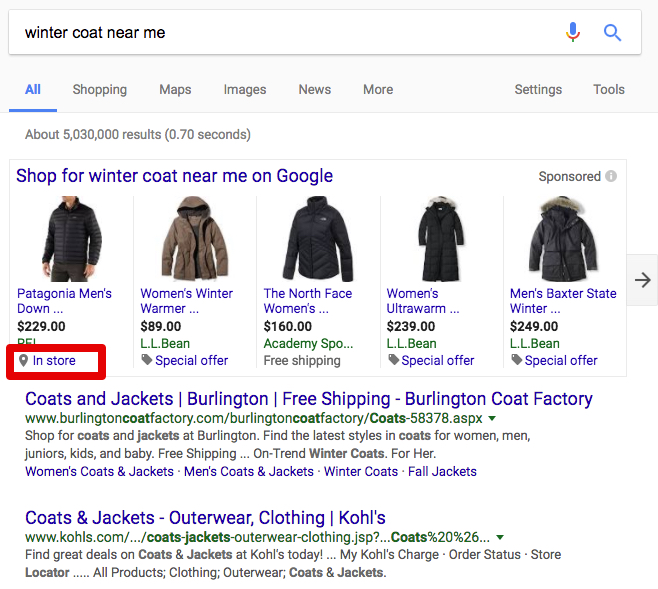
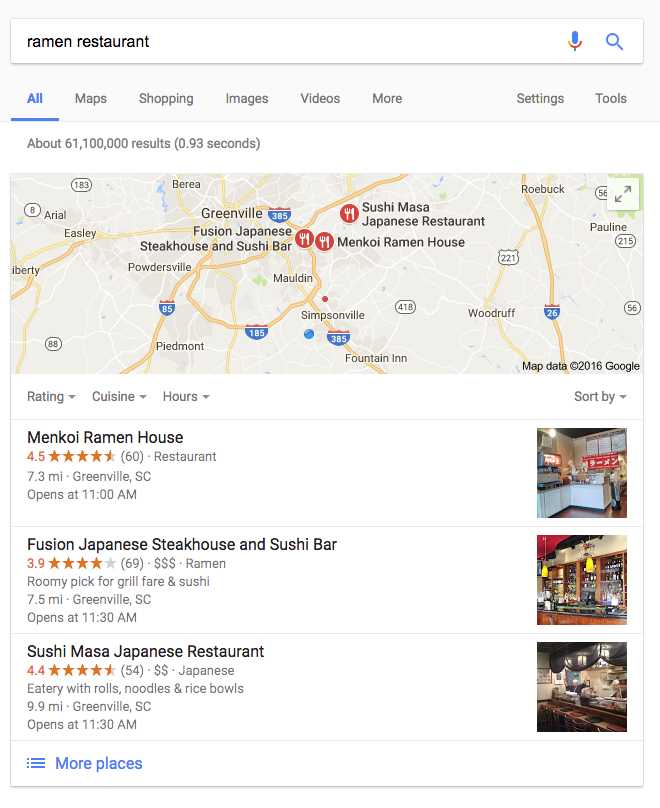
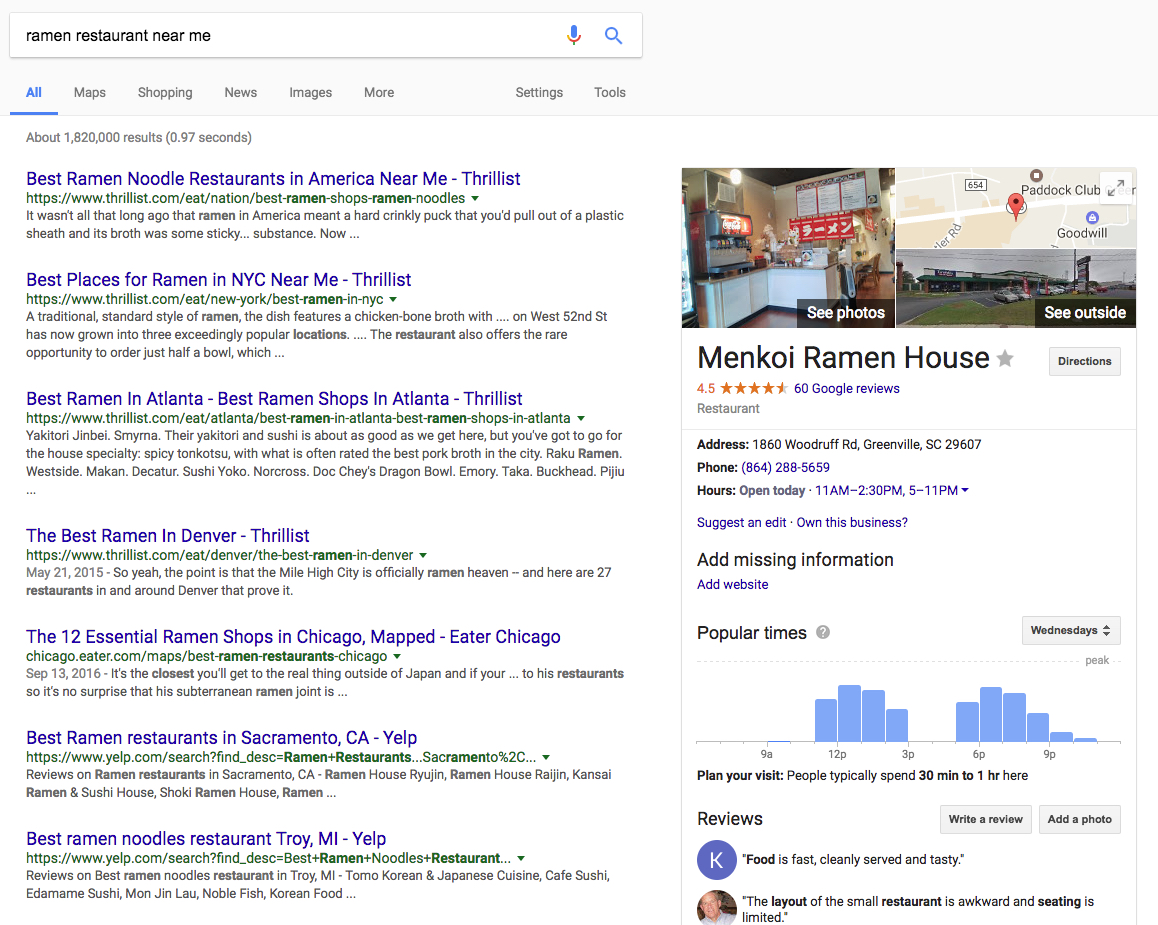
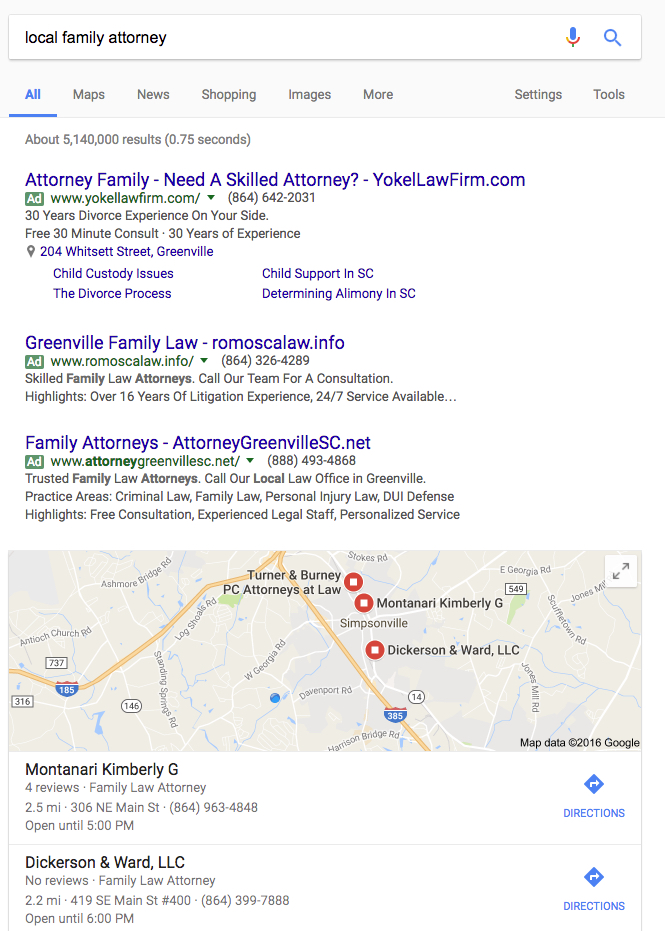
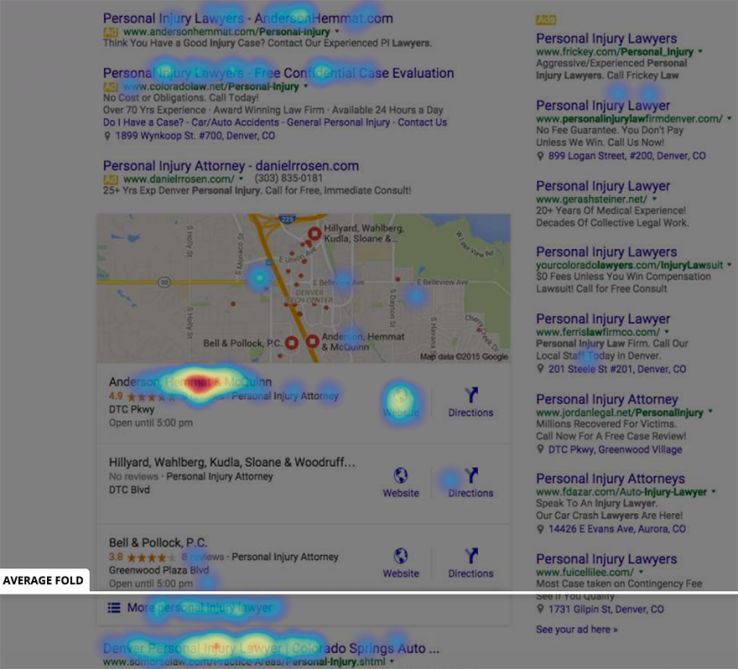
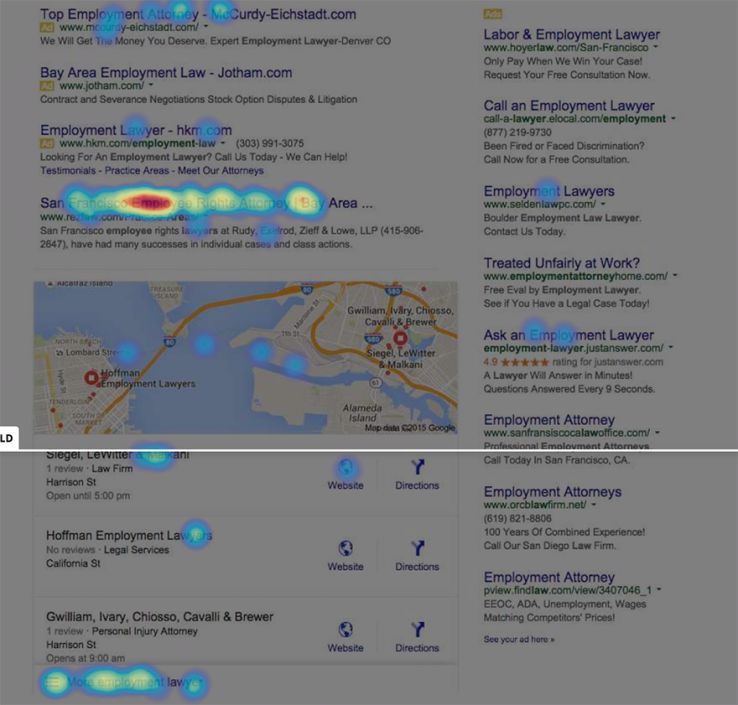
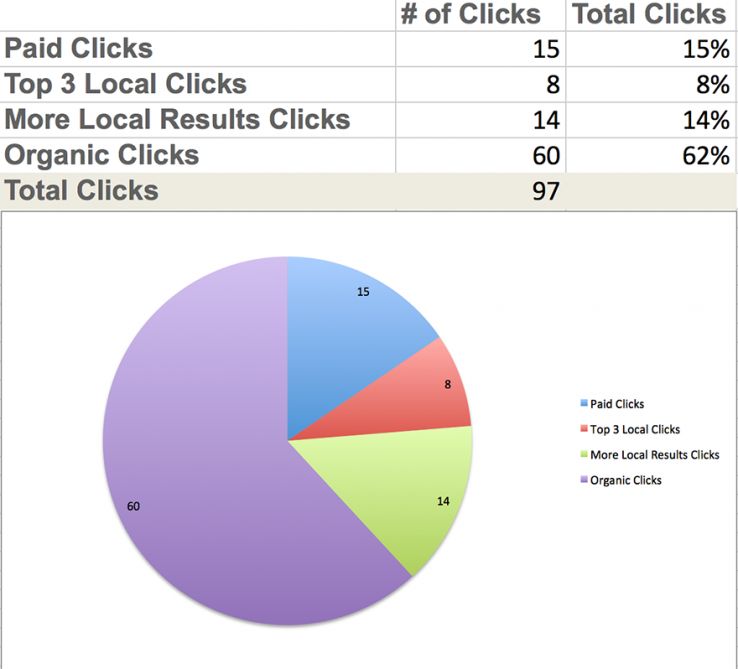




Comments (100)